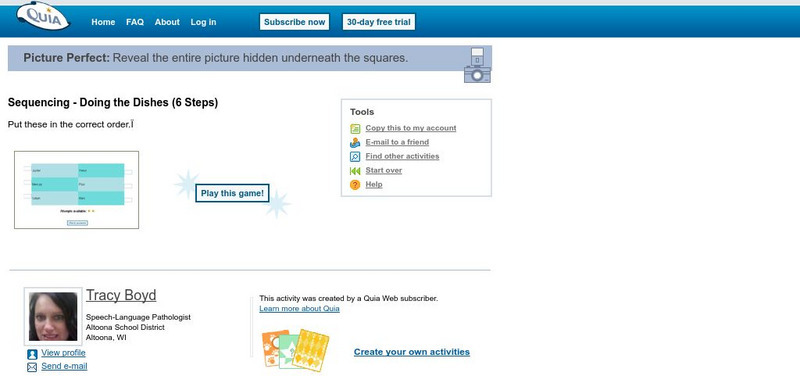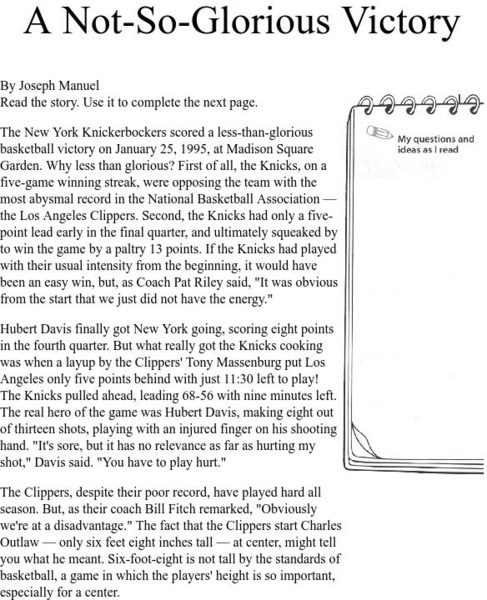EngageNY
Mid-Unit Assessment: Close Reading of Bullfrog at Magnolia Circle: Bullfrog Life Cycle
The sixth lesson plan in this Bullfrog at Magnolia Circle unit assesses your third graders' ability to read and understand informational text. The included assessment asks learners to take notes about the main idea and supporting...
Worksheet Web
Learning about Volcanoes
There's something about the classic volcano demonstration that can grab any learners' attention. Scholars begin with a reading and grand conversation about volcanoes, construct an erupting volcano using vinegar and baking soda, then...
For the Teachers
Sequence Plot Chart
Your kids can identify the plot sequence of a short story, but what about an informational article? Have them examine the chronological order of events in informational texts with a lesson on the sequence of events.
Student Handouts
Timeline Worksheet
Don't let your pupils waste another second drawing out lines for your next timeline assignment. Pass out this worksheet and get straight to the main activity!
Society of Petroleum Engineers
Renewable and Nonrenewable Energy
Energize an environmental science unit on natural resources with this collection of instructional materials. From simple coloring sheets for primary grade children, to guiding questions for a high school research...
National Park Service
Living & Non-Living Interactions
What better way to learn about ecosystems than by getting outside and observing them first hand? Accompanying a field trip to a local park or outdoor space, this series of collaborative activities engages children in...
Curated OER
Lesson 4: The Judiciary: A Brief Introduction to the Courts System
Focusing on the judicial branch of government, the fourth lesson in this series explores the structure of the US courts system. Beginning with an engaging activity based on the short story The Lady or the Tiger, students go on...
Vosonos
Interactive Minds: Solar System
Travel through space as you learn about the galaxy, solar system, planets, and much more. An extensive resource for studying astronomy in upper-elementary and middle school classrooms.
Floyd County Schools
Who Is Hibernating?
Young scientists explore the wintertime behavior of common animals with this presentation on hibernation. Offering clear explanations about the who, what, where, when, and why regarding hibernation, this resource is perfect for primary...
California Academy of Science
Guess That Spice
From medical treatments to cooking, people have been using herbs and spices for thousands of years. Perform a blind smell test of household herbs and spices to engage students in learning about ancient spice trading. Research the history...
Better Lesson
Better Lesson: Tie It Up With Transition Words to Write a Story!
Read, write, and present a digital narrative with transition words to help us put the events in order! After modeling the lesson, groups of students will write narratives to recount a short sequence of events, they will include details...
Utah Education Network
Uen: Third Grade Writing Lesson #2 / Science Prompt
Third graders will invent a gadget using one or more simple machines and write about it.
Quia
Quia: Doing the Dishes
In this game, students are to read all nine steps to making homemade pizza and then number them in chronological order to reveal a hidden picture. Java is required.
Scholastic
Scholastic: A Not So Glorious Victory
After reading "A Not-So-Glorious," Victory, which is included on this page, have your students practice identifying cause and effect using the printable worksheet.
National Gallery of Art
National Gallery of Art: The Elements of Art: Shape
Students will be introduced to one of the basic elements of art shape by analyzing the types of shapes used in various works of art to differentiate between geometric and natural shapes. They will then create their own cut paper collage...















